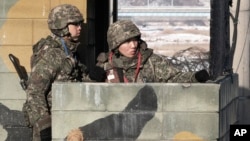The United States says it is stepping up talks with Asian allies following North Korea's execution of leader Kim Jong Un's once influential uncle.
State Department spokeswoman Marie Harf said Friday that "stability on the Korean peninsula is very important" to the United States and that Washington will "increase our discussions with our allies and partners in the region about the internal situation in North Korea."
The uncle, Jang Song Thaek, was former vice chairman of the National Defense Commission, headed by Kim. The young leader's uncle was also seen as Kim's mentor and closest aide.
North Korea's official media reported that he was charged with a list of unpardonable crimes and promptly executed Thursday.
Regional news reports said Friday that Jang's execution could signal instability in the communist country and Kim's fear of his uncle's influence. Some observers say that Jang's execution may signal unrest in North Korea and that Pyongyang could react with external provocations.
South Korean officials said the government is on alert for any unusual move in the North. But Seoul's Unification Ministry said there would be no immediate change of policy toward the northern neighbor.
Yonhap news agency reported Friday that representatives of the two Koreas will meet next week to discuss upgrading their joint industrial park in the North Korean border city of Kaesong.
North Korea's closest ally and aid donor China called Jang's execution North Korea's internal affair. Foreign Ministry spokesman Hong Lei told reporters Friday that Beijing will continue to advance business cooperation with Pyongyang.
Jang played a key role in cementing the leadership of the inexperienced Kim after the death of his father Kim Jong-Il in 2011, but analysts say his power and influence had begun to worry Kim.
Professor Toshimitsu Shigemura of Waseda University in Japan said Kim may continue with the purge.
"Jang-Thaek might be dead, but his followers are still around. Now they are what the regime fears the most. They have to get rid of them quickly if they want to avoid a rebellion, because they still have some influence. And now, everyone is aware that someone tried to rebel. The regime's power base is now unstable."
Harf denounced the execution as an "incredibly brutal act" and said it "underscores the horrific human rights record of the North Korean regime."
Pyongyang is under international sanctions for conducting illegal nuclear weapons tests. The United States and China have worked on getting Pyongyang to adhere to its international obligations.
State Department spokeswoman Marie Harf said Friday that "stability on the Korean peninsula is very important" to the United States and that Washington will "increase our discussions with our allies and partners in the region about the internal situation in North Korea."
The uncle, Jang Song Thaek, was former vice chairman of the National Defense Commission, headed by Kim. The young leader's uncle was also seen as Kim's mentor and closest aide.
North Korea's official media reported that he was charged with a list of unpardonable crimes and promptly executed Thursday.
Regional news reports said Friday that Jang's execution could signal instability in the communist country and Kim's fear of his uncle's influence. Some observers say that Jang's execution may signal unrest in North Korea and that Pyongyang could react with external provocations.
South Korean officials said the government is on alert for any unusual move in the North. But Seoul's Unification Ministry said there would be no immediate change of policy toward the northern neighbor.
Yonhap news agency reported Friday that representatives of the two Koreas will meet next week to discuss upgrading their joint industrial park in the North Korean border city of Kaesong.
North Korea's closest ally and aid donor China called Jang's execution North Korea's internal affair. Foreign Ministry spokesman Hong Lei told reporters Friday that Beijing will continue to advance business cooperation with Pyongyang.
Jang played a key role in cementing the leadership of the inexperienced Kim after the death of his father Kim Jong-Il in 2011, but analysts say his power and influence had begun to worry Kim.
Professor Toshimitsu Shigemura of Waseda University in Japan said Kim may continue with the purge.
"Jang-Thaek might be dead, but his followers are still around. Now they are what the regime fears the most. They have to get rid of them quickly if they want to avoid a rebellion, because they still have some influence. And now, everyone is aware that someone tried to rebel. The regime's power base is now unstable."
Harf denounced the execution as an "incredibly brutal act" and said it "underscores the horrific human rights record of the North Korean regime."
Pyongyang is under international sanctions for conducting illegal nuclear weapons tests. The United States and China have worked on getting Pyongyang to adhere to its international obligations.





